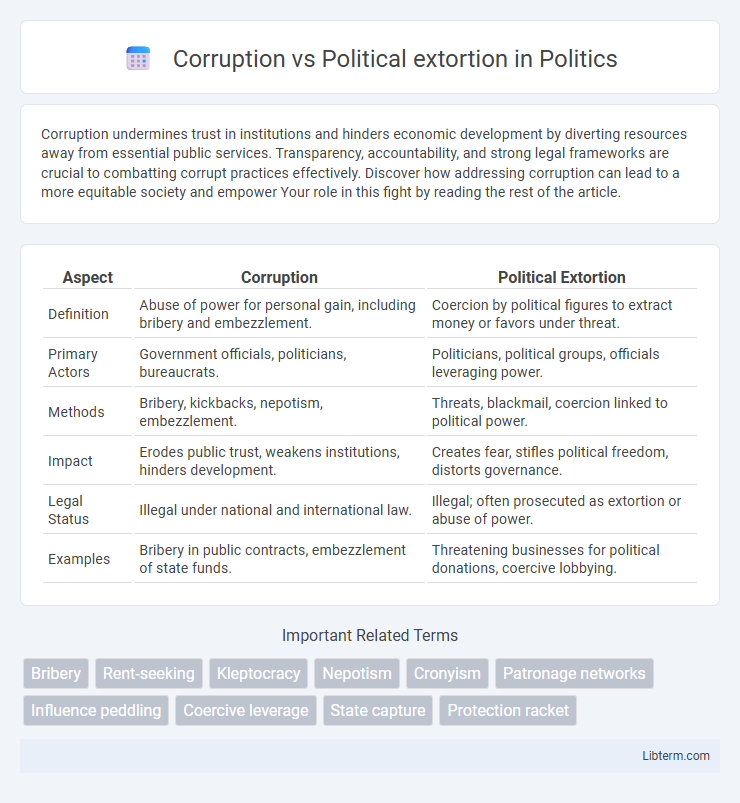Corruption undermines trust in institutions and hinders economic development by diverting resources away from essential public services. Transparency, accountability, and strong legal frameworks are crucial to combatting corrupt practices effectively. Discover how addressing corruption can lead to a more equitable society and empower Your role in this fight by reading the rest of the article.
Table of Comparison
| Aspect | Corruption | Political Extortion |
|---|---|---|
| Definition | Abuse of power for personal gain, including bribery and embezzlement. | Coercion by political figures to extract money or favors under threat. |
| Primary Actors | Government officials, politicians, bureaucrats. | Politicians, political groups, officials leveraging power. |
| Methods | Bribery, kickbacks, nepotism, embezzlement. | Threats, blackmail, coercion linked to political power. |
| Impact | Erodes public trust, weakens institutions, hinders development. | Creates fear, stifles political freedom, distorts governance. |
| Legal Status | Illegal under national and international law. | Illegal; often prosecuted as extortion or abuse of power. |
| Examples | Bribery in public contracts, embezzlement of state funds. | Threatening businesses for political donations, coercive lobbying. |
Understanding Corruption: Definitions and Types
Corruption encompasses a broad range of unethical behaviors, including bribery, embezzlement, and nepotism, that undermine public trust and distort governance. Political extortion is a specific form of corruption where public officials misuse their power to demand payments or favors in exchange for political decisions or protection. Understanding these distinctions is crucial for developing targeted anti-corruption policies and enhancing transparency in political systems.
Political Extortion Explained: Mechanics and Motives
Political extortion involves coercive tactics where officials or powerful actors demand money, favors, or influence in exchange for political support or protection, often leveraging threats of punitive actions or withholding resources. The mechanics include exploiting institutional authority to manipulate decisions, distort governance, and maintain control over political processes, which undermines democratic integrity. Motivations primarily revolve around sustaining power, financial gain, and controlling political landscapes by forcing compliance from opponents or stakeholders.
Key Differences Between Corruption and Political Extortion
Corruption involves the abuse of power by government officials for personal gain, often through bribery, nepotism, or embezzlement, while political extortion specifically refers to coercing individuals or groups, typically politicians or businesses, to provide money or favors under threat or pressure. Unlike corruption, which may be passive or involve a mutual exchange, political extortion is characterized by forceful demands and intimidation to achieve illicit objectives. Key differences lie in the nature of the act--corruption usually involves secretive transactions benefiting the official, whereas political extortion directly exploits power to extract resources through threats.
Historical Cases: Corruption and Political Extortion in Action
Historical cases of corruption and political extortion reveal systemic abuse of power for personal or political gain, such as the Watergate scandal where illicit activities were orchestrated to undermine political opponents. The Teapot Dome scandal exemplifies corruption through illegal leasing of federal oil reserves in exchange for bribes, highlighting government exploitation. Political extortion cases often involve coercing officials or businesses into providing favors or financial benefits, demonstrated by the Mafia's infiltration of political systems in mid-20th century America.
Legal Frameworks: Addressing Corruption and Extortion
Legal frameworks targeting corruption and political extortion emphasize stringent anti-corruption laws, enforcement agencies, and transparency mechanisms to deter illicit activities. Anti-bribery statutes, conflict of interest regulations, and whistleblower protections create accountability by enabling investigation and prosecution of corrupt officials and extortionists. International conventions like the UNCAC (United Nations Convention against Corruption) complement national laws, fostering cooperation to combat political extortion and promote good governance.
Impact on Governance and Democracy
Corruption undermines governance by eroding public trust, distorting resource allocation, and weakening institutional effectiveness, while political extortion intensifies these effects through coercion and manipulation of legitimate political processes. Both phenomena contribute to the erosion of democratic principles by limiting transparency, accountability, and citizens' participation in decision-making. The persistent presence of corruption and political extortion fosters instability, diminishes rule of law, and perpetuates inequality within governance structures.
Economic Consequences of Corruption vs Political Extortion
Corruption undermines economic growth by diverting public resources, increasing transaction costs, and reducing investor confidence, leading to inefficient allocation of capital and stunted development. Political extortion disrupts market dynamics by coercing businesses to make illicit payments to secure contracts or permits, inflating costs, and fostering uncertainty in the economic environment. Both phenomena erode public trust, discourage foreign investment, and contribute to income inequality, but corruption often results in broader systemic economic distortions, while political extortion tends to target specific sectors or firms.
Social Perceptions and Public Distrust
Corruption and political extortion both erode social trust by fostering perceptions of systemic injustice and abuse of power. Public distrust intensifies as citizens view officials engaging in corruption as self-serving, while political extortion is seen as coercion that undermines democratic processes. These negative perceptions contribute to disengagement from political participation and weaken institutional legitimacy.
Strategies for Prevention and Enforcement
Effective strategies for preventing corruption and political extortion include implementing transparent governance practices, strengthening anti-corruption laws, and enforcing strict penalties for violations. Establishing independent oversight bodies and promoting whistleblower protection enhances accountability and deters illicit activities. Utilizing advanced data analytics and fostering civic engagement further supports the detection and reduction of corrupt practices and extortion in political contexts.
Future Challenges in Combating Corruption and Political Extortion
Future challenges in combating corruption and political extortion include the increasing sophistication of digital technologies used to conceal illicit activities and the globalization of financial flows that complicate tracing and accountability. Strengthening international cooperation and enhancing transparency through blockchain and AI-driven monitoring systems are critical to address these evolving threats. Empowering civil society and protecting whistleblowers remain essential strategies to deter abuse of power in political and public sectors.
Corruption Infographic

 libterm.com
libterm.com